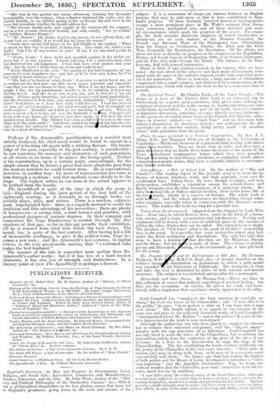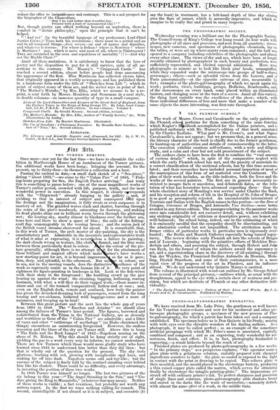PUBLICATIONS RECEIVED.
England's Greatness : its Rise and Progress in Government, Laws, Religion, and Social Life ; Agriculture, Commerce, and Manufactures ; Science, Literature, and the Arts. By John Wade, Author of the "His- tory and Political Philosophy of the Productive Classes," &c.—This is not a philosophical disquisition on the less glaring causes that have led to England's greatness ; going down to the roots and essence of the
BOOKS.
3femoirs of Sir Robert Peel. By M. Guizot, Author of "History of Oliver Cromwell," &c.
History of the Christian Church from the Election of Pope Gregory the Great to the Concordat of Worms (A. D. 590-1122). By James Craigie Robertson, M.A., Vicar of Bekesbourne, in the Diocese of Canterbury.
Letters of Queen Henrietta Maria ; including her Private Correspondence with Charles the First. Collected from the Public Archives and Private Libraries of France and England. Edited by Mary Anne Everett Green, Editor of "Letters of Royal and Illustrious Ladies," Author of "Lives of the Prin- cesses of England," &c.
Para&swara-juyana-giishthi, : a Dialogue of the Knowledge of the Supreme Lord, in which are compared the claims of Christianity and Hinduism, and various Questions of Indian Religion and Literature fairly discussed.
Twelve Months with the Bashi-Bazouks. By Edward Money, Lieutenant-Colo- nel Imperial Ottoman Army, and late Captain Bashi-Bazouks.
•
The Education of Character ; with Hints on Moral Training. By Mrs. Ellis, Author of "The Women of England," &e.
Poets and Statesmen; their Homes and Haunts in the Neighbourhood of Eton and Windsor. By William Dowling, Esq., of the Inner Temple, Barrister- at-law.
Isabel, the Young Wife and the Old Lore. By John Cordy Jeaffreson, Author of "Crewe Rise," &c. In three volumes.
The Sisters of So/cure: a Tale of the Sixteenth Century. By C. S. W.
The Good Old Times : a Tale of Auvergne. By the Author of" Mary Powell." Florence Templar.
Jessie Cameron : a Highland Story. By the Lady Rachel Butler.
The Spendthrift : a Tale. By William Harrison Ainsworth. subject : it is a succession of essays on various features in English history, that may be said more or less to have contributed to Eng- land's progress. Of these features, received historical turning-points occupy a more prominent place in Mr. Wade's estimate than litera- ture, commerce, mechanical arts, and all those material and men- tal circumstances which mark the progress of the people. For exam- ple, his book contains thirty-six chapters, of which twenty-five or twenty-six are on such matters as the Norman Conquest, the French and Baronial Wars of the Plantagenet tem, Obstructions from the Papacy to Civilization, Charles the First and the Civil War, Cromwell, the Restoration, the Revolution. Of the others, not above six bear so directly on progress as the chapters on the Population, Riches, and Social Aspects of England in 1688, or on Science, Literature, and the Fine Arts under George the Third. The balance, as the Yan- kees say, deal with general summaries.
There is little if any original research in the volume, that we have noted : the vast extent of the subjects and their mode of treatment, com- pared with the space at the author's disposal, render him somewhat gene- ral in his statements. There is, however, a large amount of information compressed into a small compass, and illustrated by a commentary, in the main judicious, which will render the book useful to a numerous class of persons.
The Spirit of Travel. By Charles Packe, of the Inner Temple.—The theme as it were of Mr. Packe's little book is an autumnal trip in Switzerland, by a pretty good pedestrian, who gives some striking de- scriptions of scenery and his walks among it, besides throwing out some useful hints to travellers. A large part of the book, however, consists of digressive discussion, sometimes on topics that the journey turns up,— as the prospects of cordial union between the French and English ; some- times on remoter subjects—as "Uncle Tom" and an American lady induce a disquisition on American slavery ; not unfrequently the dis- quisitions are on remoter matters, being pretty much "de omnibus rebus," with quotations from the poets.
Plain Sermons preached to -a Countey Congregation. By Rev. J. J. Blunt, B.D., late Margaret Professor of Divinity in the University of Cambridge.—Thirty-six Sermons of a practical kind, dealing with duties rather t an doctrines. They are short, close in style, and often have a
plain etness that no doubt drove home the lesson to the minds of the Essex 'cultural congregation before which they were preached. Though ot rising to that literary excellence or originality which admits extensiv newspaper notice, they form a valuable addition to contempo- rary fa y sermons.
SidneylGrey : a Talc of School Life. By the Author of " 11fia and Charlie."—The leading object of this juvenile story is to show the in- fluence of honour, kindness, truth, and high principle, even over ill- conditioned boys. Sidney Grey, the hero, though a cripple, and very plain-spoken, establishes a reputation among his schoolfellows, and finally triumphs over the false accusations of a malicious enemy. Be- sides thelichool life of Sidney and his brother, there is the home life of the Grei family, chiefly in a reverse of fortune. The whole book is well vnWten ; and the school adventures are interesting, though some- what overdone, especially taken in connexion with the domestic occur- rences. This renders the book too long for a juvenile tale.
Voices from the Greenwood. Adapted front the Original by Lady Wal- lace.—Four tales, in which flowers, trees, water in the form of a moun- tain stream, and a stone, are narrators and interlocutors. Feeling and sentiment will be found, with a sort of artificial grace in the manner of telling the tales, if tales they can be called. The interest to us is slight. The question of " Cui bono ? what is the good of all this ?" perpetually rises to the mind. It is possible that some instructive object may lurk under the florid sentiments and descriptions. The only two tales that seem to have a leaning i that direction are the Mountain Stream and the Stone ; but not II a is made of them. The volume is prettily
got-up and illustrated; g, so far as externals go, a nice gift-book for the young.
The Prostate d and its Enlargement in Old Age. By Deeimus Hodgson, M.D. a., M.R.C.S. Engl., &c.—A treatise founded on the author's Mau. .1 dissertation on graduation, to which a gold medal was awarded the University of Edinburgh. The treatment is clear and full ; the text is illustrated by plates of both natural and morbid structure. The subject is too technical and peculiar for a newspaper.
Melancholy and other Poems. By Thomas Cox.—There are lines in this collection of verses that indicate something of poetical feeling ; but they are the exceptions. As wholes, the pieces are crude and Mart- istical, with a simpleness that sometimes closely approaches to the silly.
Lord Campbell has "employed the long vacation in carefully re- vising" his work the Lives of the Chancellors ; and "I now offer it to the public," he says, "in as perfect a state 'als I can hope that it may ever attain." The fourth edition is to appear in ten volumes of the same size and price as the collected historical works of Lord Campbell's "distinguished friend Mr. Hallam " ; and as the author "despairs of fur- ther improvements the work is now stereotyped."
Although the author has not only been spared to complete his labours but to witness their universal acceptance, still the " aliquid amari " mingles with the cup and turns all to bitterness. Lord Campbell has not only lived to write the Lives of the Chancellors, but to witness the degradation and he fears the extinction of the glory of the office if not its name. In a Note to the Introduction he sings the dirge of the Chancellorship. The Act establishing the Lords Justices ruthlessly cut the power of the Chancellor in his own court into two : "ii' his taste so incline, [lie] may sit along with them, or he may sit in a separate court concurrently with them." No longer .ago than last session, the leaders of both parties and the House of Lords determined to introduce a " divi- sum imperil=" into the Appellate Jurisdiction ! Nay, we learn, not without wonder, that the Chancellor, poor man ! cannot live upon his in- come, much less lay by anything.
"I care little about the reduced salary of the Lord Chancellor, although it is not now sufficient to enable him to keep a carriage, and to exercise be- coming hospitality, much less to make any provision for his family. Against poverty a noble struggle may be made ; but there scent to be causes in opera- tion which, in spite of the most eminent learning and ability, must speedily
reduce the office to insignificance end contempt. This is a sad prospect for the biographer of the Chancellors.
• May I lie cold before that dreadful day, Pressed with a load of monumental clay ! "
But, though poetry can afford nothing beyond an aspiration, there is comfort in "divine philosophy," upon the principle that it can't be helped.
" And yet' (in the beautiful language of my predecessor, Lord Chief Justice Crewe,)' Time bath his revolutions ; there must be a period and an end to all temporal things—finis rerum—an end of names and dignities, and whatever 3.8 terrene. For where is Bohan? where is Mowbray ? where is Mortimer ? :Ittyr, which is more and most of all, where is Plantagenet? They are entombed in the urns and sepulchres of mortality' !! !—And why not the Marble Chair ?"
Amid all these mutations, it is satisfactory to know that the love of poetry and the disposition to pay for it still survive, spite of all as- sertions to the contrary. Mr. Massey's " Craigcrook Castle" has reached a second edition, almost before people had done announcing the appearance of the first. Miss Martineau has collected eleven tales, that originally appeared in a weekly newspaper, and has published them in a handsome form under the title of Sketches from Life "; which in point of subject many of them are and the writer says in point of fact. "The Mother's Mistake," by Mrs. Ellis, which we assume to be a re- print, is sent forth by Messrs. Houlston and Stoneman in a neat style, in double columns—an immense quantity of type in a small compass.
Lives of the Lord Chancellors and Keepers of the Great Seal of England, from
the Earliest Times to the Reign of King George IV. By John, Lord Camp-
bell, LL.D., F.R.S.E. Fourth edition. In ten volumes. Volume I. Graigcrook Castle. By Gerald Massey. Second edition, revised.
The Mother's Mistake. By Mrs. Ellis, Author of" Family Secrets," &c. With Illustrations by Anelay.
Sketches from Life. By Harriet Martineau. Illustrated. The Use of Sunshine: a Christmas Narrative. By Menella Bute Smedley, Au- thor of "Nina," &c. Second edition.
ALMANACIC.
The Literary and Scientific Register and Almanack, for 1857. By J. W. G. Gutcb, M.R.C.S.L., late Foreign Service Queen's Messenger.

































 Previous page
Previous page